| Reviews & Columns |
|
Reviews DVD TV on DVD Blu-ray 4K UHD International DVDs In Theaters Reviews by Studio Video Games Features Collector Series DVDs Easter Egg Database Interviews DVD Talk Radio Feature Articles Columns Anime Talk DVD Savant Horror DVDs The M.O.D. Squad Art House HD Talk Silent DVD
|
DVD Talk Forum |
|
|
| Resources |
|
DVD Price Search Customer Service #'s RCE Info Links |
|
Columns
|
|
|
Clive of India (Fox Cinema Archives)
More romance than action in this once well-regarded early "epic." 20th Century-Fox's Cinema Archives, their specialty vault of hard-to-find library and cult titles, has released Clive of India, the 1935 biopic from Joseph M. Schenck and Darryl F. Zanuck's 20th Century Pictures, starring Ronald Colman, Loretta Young, Colin Clive (yes, a direct descendent of the movie's real-life hero), Francis Lister, C. Aubrey Smith, and Caesar Romero. Simplified, pro-British Empire history to be sure, with a not uncommon-for-the-time emphasis on studio-bound romance rather than hard-charging action, Clive of India works best today as a chance to see icons Colman and Young doing what they did best: be movie stars. No extras for this sub-par black and white transfer.
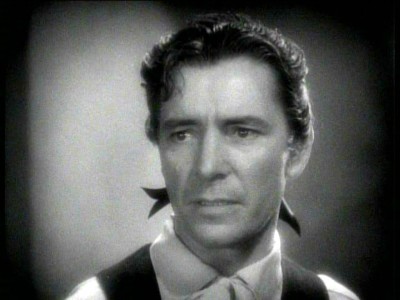
According to Clive of India, the subcontinent of India in 1748 was a hotbed of mercantile and militaristic intrigue, with Dutch, French, Portuguese, and British companies all vying to control this "Paradise of Treasure" and its natural resources. The East India Company represented the British government's interest, backed by a nominal force of regular army troops and naval support. Troublemaker Robert Clive (Ronald Colman), tired of being a mere clerk in the Company's Fort St. David headquarters, and believing his life's destiny offers greatness, impetuously decides to take a demotion within the Company and join the British regulars when word comes that the French are on the move to eject the Company from one of its strongholds. Disgusted with the lackadaisical, by-the-book timidity of his superiors, such as pompous Captain Johnstone (Colin Clive), Clive disobeys orders and sneaks back to headquarters...where he's further dismayed by the cowardly members of the Company's board. Pledging to break the French's back at Arcot by any means available, the brash Clive is given his head by Governor Pigot (Montague Love), who can only assemble a ragtag group of 125 men. Miraculously, Clive captures Arcot, and his destiny is set. Just as remarkable is his courting of Margaret Maskelyne (Loretta Young), the sister of Clive's best friend, Edmund (Francis Lister). Communicating only by letters (which take 1 year to arrive, one way), Clive just knows that Margaret is the woman for him, a fearless act of courage that Margaret reciprocates when she gives her heart to Clive at their first meeting. Unfortunately, Clive's destiny as the procurer of India into England's empire is fraught with financial, military―and emotional―hardship.
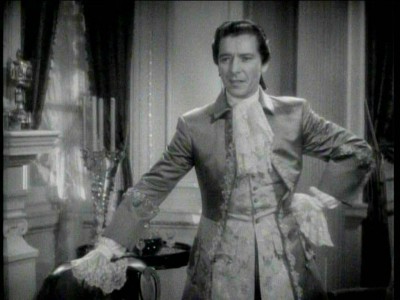
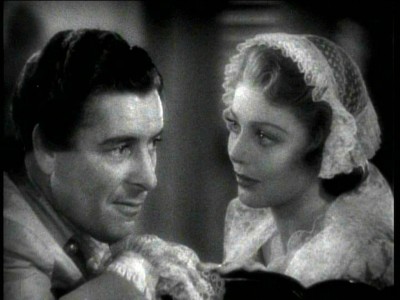
As a little kid, one of the first movie books I ever bought for myself was called The Great Adventure Films by Tony Thomas. It was that kind of early movie book from the 70s, produced for a broad, general audience, that had lots of black and white pictures of old-time movies still held up at that time as stirring examples of the genre (before Spielberg and company went hyperactive)―a few of which today's younger audiences might look at slightly askance, owing to their now by-contrast, tamer pleasures. I lost that book in a move a long, long time ago, but I wouldn't be surprised if Clive of India was one of its entries. It was a hit in 1935 for Zanuck, when biopics were all the rage, and British Colman was still king of the historical romance/action genre (right before Tasmanian Errol Flynn became its most iconic interpreter).
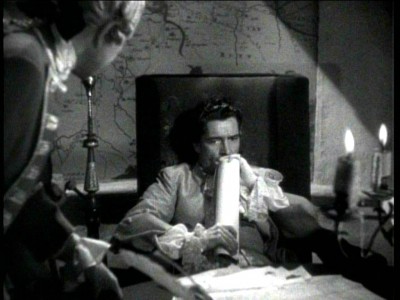
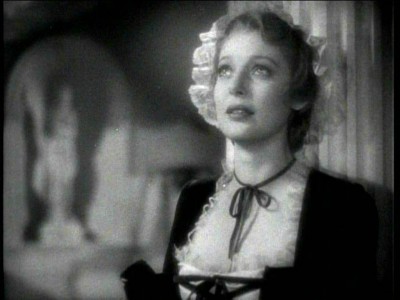
Seen today, however, aside from one smashing battle sequence, Clive of India's focus on romance makes the movie come off as resolutely talky―not necessarily a bad thing at all when Ronald Colman is doing the talking―but still a bit of a surprise when one is expecting an action "epic" with Clive of India's dusty reputation. Anyone looking to Clive of India for historical background on the inclusion of India into the British Empire will have to look elsewhere; its signpost history, while somewhat accurate, is sketchily developed at best, with huge chunks of Clive's astounding military feats in India either ignored or completely glossed over. Of course in today's repressive world of "academic film criticism," ruled by the two iron fists of political correctness and ridiculously self-involved self-seriousness, an openly pro-Empire, pro-war title like Clive of India is fit only to be either laughed at or scorned by those that toe the party line―not so much because Clive of India is simplistic in message, but because its message has now been deemed by the Left as not just "wrong"...but evil. After decades and decades of American and English movies that have castigated and lampooned England's war heroes and its once glorious-yet-imperfect militaristic past―and thus having conditioned us to recoil from rather than celebrate anything that smacks of her patriotism (here in the States, too)―it's almost impossible, then, to watch Clive of India with any grasp of the context in which it was intended...regardless of the historical "right" or "wrong" of it.
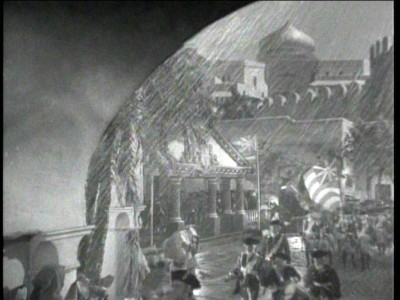
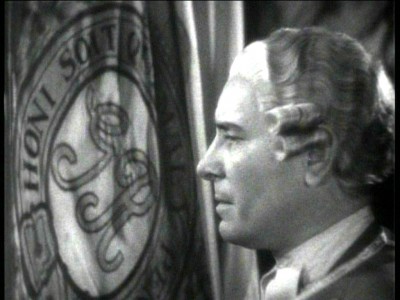
As to its biopic conventions, Clive of India plays no different, really, than so many other of those "great man with greater woman behind him" outings that were so prevalent during the genre's golden era. The script, by W.P. Lipscomb and R.J. Minney, hints at real-life Clive's troubled psyche, introducing him dueling with Captain Johnstone (where he asks to be shot in the head), and having him admit he tried to kill himself two times before (rather remarkable, post-Code, in that he's not castigated for this admission). The script doesn't go into enough detail about anything in Clive's life, really, pasting over giant holes in the narrative with simple title cards (at times, Clive of India comically resembles those early transitional talkies, where a silent-shot movie was retro-fitted with a soundtrack...with all the title cards still left in). It does manage, though, to mention one or two things we don't expect, like that suicide admission or acknowledging that the Indians rightly distrusted the Whites because of the rampant corruption they fostered with the East India Company. Clive of India is much better, surprisingly, when it's lighter, particularly when it lets Colman be funny and cynical (his aping his mercantile "betters;" his egotistical adding of a half pound to his newborn baby's announced weight for the benefit of his public). And certainly fans of romance won't mind that hypnotically smooth, "Colmanized" voice making love to gorgeous Loretta Young (who else could get away with, "That's courage, by gad, that's courage!" than sublime Colman?) Action fans will mostly find Clive of India wanting...until the Battle of Plassey, which Polish-born director Richard Boleslawski (Rasputin and the Empress, The Painted Veil, Fredric March's Les Miserables, the superlative Theodora Goes Wild) shoots in a Eisenstein-like montage of extreme close-ups of screaming faces and flashes of sabers as fantastical "battle elephants" rampage, eating men head-first as their spiked feet impale more victims. It's a beautiful bit of Soviet montage, completely at odds with most of the rest of staid, placid, conventional Clive of India...and probably the sole reason the movie garnered a reputation as an epic classic for decades.
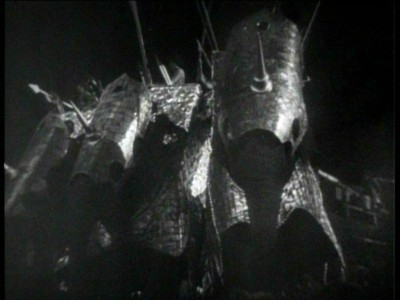
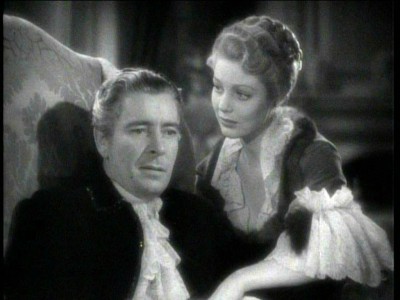
The DVD:
The Video:
The full-screen, 1.33:1 black and white transfer for Clive of India looks rough and noisey: a grainy, scratched print was utilized, with contrasty sequences, and a soft image.
The Audio:
As well, the Dolby Digital English mono audio track is squealchy, with lots of pops and hiss. No subtitles or closed-captions.
The Extras:
No extras for Clive of India.
Final Thoughts:
A dusty "epic" that focuses more on talk than action. The real Robert Clive lived a life worthy of ten movies, but Clive of India skips about, hitting just a few of his highlights, leaving the fighting largely off-screen while devoting lots of time to Ronald Colman and Loretta Young loving and suffering. And that might be enough for you, if you're in the right mood. A rental is best for Clive of India.
Paul Mavis is an internationally published movie and television historian, a member of the Online Film Critics Society, and the author of The Espionage Filmography.


|
| Popular Reviews |
| Sponsored Links |
|
|
| Sponsored Links |
|
|
| Release List | Reviews | Shop | Newsletter | Forum | DVD Giveaways | Blu-Ray | Advertise |
|
Copyright 2024 DVDTalk.com All Rights Reserved. Legal Info, Privacy Policy, Terms of Use,
Manage Preferences,
Your Privacy Choices | |||||||













